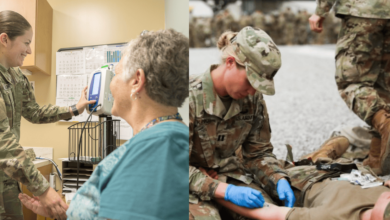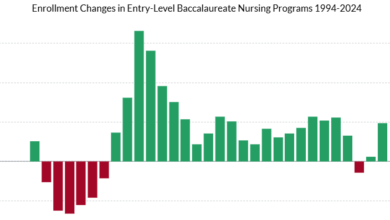Wales to introduce nursing associates

The Welsh health minister has confirmed her intention to introduce nursing associates to Wales.
In a statement this afternoon, Eluned Morgan said: “This decision is based on the biggest and most impactful review of nursing in Wales since the introduction of the graduate nurse in 2004.”
“There is a real risk to patient safety if boundaries become blurred”
Sandy Harding
The Welsh Government will liaise with the UK Government, which holds the power to make the required legislative changes, to progress the plans, said Ms Morgan.
The Nursing and Midwifery Council (NMC) – which would regulate the role – has been notified.
The announcement comes after Nursing Times reported earlier this month that the Welsh Government was “considering” the nursing associate role.
Currently, nursing associates only exist in England.
The band 4 role is intended to sit at a level between nursing assistant and registered nurse.
When they were introduced in England, in 2019, the Welsh Government at the time declined to follow suit.
However, Ms Morgan said her government’s research concluded that, in Wales, there was a “significant under-utilisation” of the current unregulated band 4 nursing roles and an inconsistency in the way they are implemented across its NHS.
She added: “Over the coming weeks the full project report will be published, and later this year we will undertake public consultation on developing the parameters of practice for the new role in Wales.
“This is a momentous decision for nursing and is vitally important for the quality and safety of care provided to patients as well as improving patient outcomes.”
Andrea Sutcliffe, NMC chief executive and registrar, welcomed the request from the Welsh Government to introduce the post in Wales.
She explained that the proposal would now be discussed and decided on by the NMC Council.
“It would require the UK Government to make changes to our legislation,” Ms Sutcliffe said.
“We look forward to working with our partners on this important proposal.
“More than 10,000 nursing associates have joined our register since 2019, helping to bridge the gap between registered nurses and health and care assistants in England.
“The role has also proved a successful pathway for almost 1,500 professionals who have gone on to become registered nurses.
“We know they’ve made a valuable contribution to safe, kind and effective care for people using health and social care services.”
“We look forward to working with our partners on this important proposal”
Andrea Sutcliffe
The Royal College of Nursing (RCN) Wales branch expressed disappointment at the minister’s announcement on the grounds there had been no public consultation to decide whether the post should be introduced in the first place.
Sandy Harding, RCN Wales associate director of professional practice, said: “The health minister has said she’s committed to consulting on ‘developing the parameters of practice for the new role’ but for such a huge change to patient care in Wales this is simply not enough – there should be public consultation and scrutiny from the Welsh Parliament.
“With almost 3,000 registered nurse vacancies in NHS Wales – and due to current financial pressures – there is a real risk to patient safety if boundaries become blurred and health boards employ band 4 nursing associates instead of filling the vacancies with appropriately qualified nursing staff.
“Whilst both registered nurses and nursing associates are accountable for the care they provide, it is only the responsibility of the registered nurse to assess care needs, plan, lead and manage care, and evaluate the care provided.”
Ms Harding further criticised Ms Morgan for not consulting with the RCN before making what she called a “momentous decision”.
However, she added: “Of course, the RCN will work with the Welsh Government to ensure the risk to patient safety is minimised and that the nursing workforce clearly understands their responsibilities and scope of practice.”






